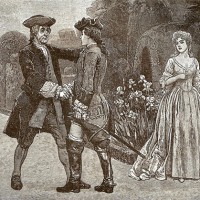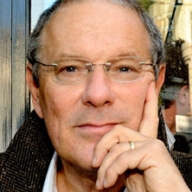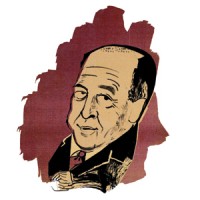A Scottish Remembrance of Russell Kirk, by Alvino-Mario Fantini
The Conservative Mind‘s author taught generations to re-enchant the world.
As an undergraduate, my first encounters with Professor Jeff Hart and The Dartmouth Review eventually led to my discovery of the works of Russell Kirk. Like William F. Buckley Jr., Kirk wrote about the need to raise, as historian George Nash put it, a “full-scale challenge to modernity”—in the arts, literature, religion, and politics. While both Buckley and Kirk enchanted me with their obvious love of language and mastery of words, it was Kirk who also managed to stir my spirit with an affection, kindness, and warmth that I did not find elsewhere. Here was a gentle, conservative aesthete.
But I’m not the only one who was affected in such a way by Kirk. And last year, to mark the 60th anniversary of the publication of his most famous work, The Conservative Mind, there were several tributes. Last summer, The University Bookman, which Kirk founded in 1960, published an on-line symposium discussing the book. In July, the Liberty Fund also published a tribute, along with three excellent rejoinders. In September, two more events took place: Lee Edwards at the Heritage Foundation hosted a panel with Matthew Spalding, Yuval Levin, and Peter Wehner to discuss the book’s impact; and a few days later, the Intercollegiate Studies Institute, The Imaginative Conservative, and the Russell Kirk Center for Cultural Renewal co-sponsored a one-day seminar at Houston Baptist University.
Scottish Celebrations
One of the more interesting commemorations took place October 18-20 in Scotland, where a distinguished group of students and academics joined members of the Kirk family and their close friends at the University of St. Andrews to discuss The Conservative Mind—and to remember, in Willmoore Kendall’s words, the “benevolent sage of Mecosta”.
Some people aren’t aware that Kirk was a doctoral student at the University of St. Andrews; in fact, he remains the only American to have received a Doctor of Letters (D.Litt.) from that esteemed university. His dissertation, titled “The Conservative’s Rout”—later re-named The Conservative Mind in discussions with publisher Henry Regnery—is still on file at the university, and the anniversary celebrations in Scotland began, appropriately enough, with a viewing of the original dissertation on Friday afternoon.
Attending the weekend’s events were a dozen or so promising young Americans, all current or former Wilbur Fellows who, after working for Russell and Annette Kirk, went on to study at St. Andrews. It was impressive to hear the deep affection with which each of them spoke about the Kirks—and about the time they spent at his ancestral home at Piety Hill.
Various Europeans also joined the celebrations—for, despite his focus on an ‘Anglo-American’ political tradition, many of Kirk’s published works are known across Continental Europe. Some have even been translated into Spanish, German, and Italian, and his ideas have influenced a range of European scholars. In Germany, Kirk’s contributions as a ‘conservative man of letters’ were recognized as so important, that he merited a lengthy entry (and photograph) in the Lexikon des Konservatismus (Dictionary of Conservatism), a 1996 work edited by the German noble, Caspar von Schrenck-Notzing. Today even young members of Sweden’sKonservativt Forum are wont to quote Kirk approvingly.
The always charming and energetic Annette Kirk was also present in Scotland, along with two of her daughters and their families. On Friday evening, she hosted a private reception and dinner at the cliff-side Russell Hotel, where guests were treated to a talk by André Gushurst-Moore, currently Director of Pastoral Care at Downside School, an institution attached to the Benedictine Downside Abbey in Somerset, England.
Gushurst-Moore elaborated on some of the principal themes in Kirk’s works, speaking of Kirk’s defense of humane learning, the moral imagination, and “the permanent things.” Not coincidentally, these are precisely the themes closest to Gushurst-Moore’s own work. In his recent The Common Mind: Politics, Society and Christian Humanism from Thomas More to Russell Kirk (published in 2013 by Angelico Press), he profiles 12 great ‘Christian Humanists’ through the centuries, including Thomas More, Dr. Johnson, Edmund Burke, Orestes Brownson, and Russell Kirk, among others.
His was an eloquent and respectful tribute, which many found quite moving. It was a testament of sorts to the impact that Kirk’s writings—and his gentle character—had on people. And nearly two decades after his death, Kirk continues to touch people with the evocative power of his words (the late Frederick Wilhelmsen said “Kirk was essentially a poet who wrote in prose”). What a reminder of those T.S. Eliot lines from Four Quartets which Kirk was so fond of quoting: “the communication / Of the dead is tongued with fire beyond the language of the living.”
Read the complete article in The Imaginative Conservative
Stand up for the real meaning of freedom, by Roger Scruton
When pressed for a statement of their beliefs, conservatives give ironical or evasive answers: beliefs are what the others have, the ones who have confounded politics with religion, as socialists and anarchists do. This is unfortunate, because conservatism is a genuine, if unsystematic, philosophy, and it deserves to be stated, especially at a time like the present, when the future of our nation is in doubt.
Conservatives believe that our identities and values are formed through our relations with other people, and not through our relation with the state. The state is not an end but a means. Civil society is the end, and the state is the means to protect it. The social world emerges through free association, rooted in friendship and community life. And the customs and institutions that we cherish have grown from below, by the ‘invisible hand’ of co-operation. They have rarely been imposed from above by the work of politics, the role of which, for a conservative, is to reconcile our many aims, and not to dictate or control them.
Only in English-speaking countries do political parties describe themselves as ‘conservative’. Why is this? It is surely because English-speakers are heirs to a political system that has been built from below, by the free association of individuals and the workings of the common law. Hence we envisage politics as a means to conserve society rather than a means to impose or create it. From the French revolution to the European Union, continental government has conceived itself in ‘top-down’ terms, as an association of wise, powerful or expert figures, who are in the business of creating social order through regulation and dictated law. The common law does not impose order but grows from it. If government is necessary, in the conservative view, it is in order to resolve the conflicts that arise when things are, for whatever reason, unsettled.
Read the complete article in The Spectator
What Obligations to Other Animals Are Not, by Christopher O. Tollefsen
Charles Camosy’s new book argues that we should treat animals with the same Christian justice that underlies our treatment of other people. But human beings and other animals are not fundamentally equal in the way that all human beings are, as free and rational beings created in the image of God.
Read the complete article in Public Discourse
A Noble Imagination: Sir Walter Scott’s Waverley, by James P. Bernens
If you would wish for your children to garner a love and fascination for the good things of God’s Creation, if you would have them embrace adventure, cherish what is noble, honor the poor, and attain to a sincere civility and gentleness, let them read from the works of Sir Walter Scott.
Born in 1771 in the city of Edinburgh, Walter Scott came of age in a century that had seen the uneasy political union of the kingdoms of England and Scotland, and was about to see the upheaval of the American and French Revolutions. Drawing from the deep well of British and medieval history, Scott established himself as one of the premier poets of his age, and one of the finest pure storytellers the English language has ever seen. His first novel, Waverley, remains once of his best, although it is less recognizable to modern readers than many other excellent titles like Ivanhoe and Rob Roy.
First published in 1814, Waverley is a lovely and heroic tale which follows the journey of young Edward Waverley, an impressible English gentleman and army officer, who is posted to duty in the tumultuous scene of eighteenth-century Scotland. Mindful of the old Royalist history of his own family, and carried on a string of fate that brings him into league with a Highland clan, Waverley becomes embroiled in the 1745 “Jacobite” rebellion, which seeks to replace Britain’s King George with the exiled Catholic Stuarts. If this chapter of British history sounds obscure, the reader may be comforted to know that much context is incorporated into the fabric of the story by the keen antiquarian mind of Sir Walter Scott himself.
More than anything, Waverley evolves into an adventurous ramble through the genteel courts and fearsome wilds of Scotland and England. There are portions of the novel which simply cannot be forgotten: as when Waverley stands enchanted by the Gaelic music of beauteous Flora Mac-Ivor; or when the rash hero suddenly finds himself pledging his sword in the service of the charismatic Jacobite leader, Bonnie Prince Charlie; or when the great Catholic Highland chieftain, the Vich Ian Vohr, manfully meets his end with the laughing phrase, “This is well got up for a closing scene.”
But the excellence of Waverley extends beyond the many opportunities for suspense and enjoyment which it affords the reader. Like much else that Scott wrote, it provides a lesson in poetry and healthy imagination, and reassures the observant mind of the goodness of the age-old morals. It was this quality in Scott’s writing which drew the special admiration of another venerable Briton, the famous Catholic convert John Henry Newman. In 1839, six years before his conversion to Rome, Newman wrote:
During the first quarter of this century a great poet [Scott] was raised up in the North, who, whatever were his defects, has contributed by his works, in prose and verse, to prepare men for some closer and more practical approximation to Catholic truth. The general need of something deeper and more attractive than what had offered itself elsewhere, may be considered to have led to his popularity; and by means of his popularity he re-acted on his readers, stimulating their mental thirst, feeding their hopes, setting before them visions, which, when once seen, are not easily forgotten, and silently indoctrinating them with nobler ideas, which might afterwards be appealed to as first principles.
Newman saw in Scott’s writing—of which Waverley is a foremost example—an excellence and superiority that helped move men’s minds towards a healthy Christian culture. For the same reason, Dr. Russell Kirk, writing in 1993, esteemed Sir Walter Scott as one of his ten exemplary conservatives in the history of Western Civilization.
Now, after all this has been said, you might be moved to ask: “If this is true, why have I heard and seen so little of the books written by this eminent Scotsman?”
Read the complete article in Crisis Magazine
What is a rich man, by Theodore Dalrymple
“The rich man is he who has enough to meet his desires and who, moreover, exercises control over his desires so that they do not expand indefinitely to torment him with dissatisfaction when they are not fulfilled.”
Theodore Dalrymple
Published in The Salisbury Review, Autumn 2013
Underrated: C.S. Lewis, by Judith Wolfe
Children’s books and popular presentations of Christian belief are what C.S. Lewis, who died 50 years ago this month, is best known for. But what makes him a favourite for earnest Christians’ christening and confirmation gifts — undaunted supernaturalism and doctrinal conservatism combined with an enticing rhetoric of certitude — makes him distasteful and a little suspicious to us intellectuals: “Mr Lewis is always clever” is the usual snub in Oxford Senior Common Rooms.
A.N. Wilson, in what is still the most widely read biography of Lewis, tries to dispel the magic by meticulously mapping Lewis’s intellectual development onto a well-worn Freudian chart of childhood trauma, repressed sexuality and frustrated ambition. But the diagnoses don’t really stick. There is no doubt, for example, that his mother’s death from cancer when he was nine left an indelible mark on Lewis’s psyche and imagination; but his responses to this and other blows were never obvious or merely reflexive. Indeed, one of the things that make Lewis remarkable is that, exactly contrary to Wilson, he never allowed experiences to become determining causes of his actions or convictions, but actively took hold of them as occasions for learning and, not least, self-questioning. The outcomes of such reflection were often unexpected, and Lewis accepted their consequences with uncompromising honesty.
One such conclusion was his conversion. The deaths first of his mother and then of his friends on the battlefields of the Great War aroused in the aspiring young poet a deeply felt and perfectly commonplace rage against a tyrannical God: “Come let us curse our Master ere we die, / For all our hopes in endless ruin lie. / The good is dead. Let us curse God most High,” Lewis wrote in his cycle of war poems, Spirits in Bondage, with all the consternation of Wilfred Owen or A.E. Housman. But probing further, he realised that it didn’t work — not because his protest was ineffectual but because it was incoherent. Richard Dawkins captures the reason well. When, at a 2012 podium discussion between Dawkins and Rowan Williams, an audience member asked tremulously what to make of the tragedy of an innocent child’s death, Dawkins shrugged that he could see here no puzzle or tragedy, but only an instance (sad perhaps for the mother, but unremarkable in itself) of the evolutionary principle of natural selection. Lewis came to the same conclusion: without God, there is no problem of evil. We may certainly ask, “If God exists, why does he allow evil?” — but we cannot answer that there is no God, or that he is a “brute and blackguard” morally inferior to any ordinary human, without also giving up our own sense of the outrage of evil. For if there is a creator God at all, then human reason, desire and moral intuition have their source in Him no less than the material world does; and if there isn’t, then any moral standard available to us can only derive from the same material processes that govern evolution, and so cannot ground the sort of outrage at the world’s futility that is irreducibly experienced as unconditional and absolute rather than merely relative and practical.
Read the complete article in Standpoint





